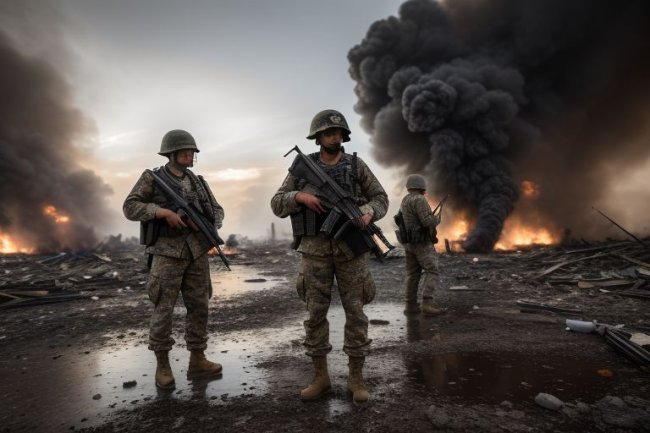Combating Terrorism and Extremism
Combating terrorism and extremism has emerged as a critical worldwide concern. As these risks loom, large, subnational, and national governments acknowledge the critical necessity for collaborative efforts and unshakable collaboration across states to meet this common problem. Only by pooling their resources will they be able to mount a credible fight against these evil forces.

Terrorism and extremism have emerged as pervasive threats, transcending borders and ideologies. They feed on chaos, instilling fear and division among communities. To confront these challenges effectively, subnational and national governments must foster intelligence sharing, coordinated law enforcement, and robust counterterrorism initiatives that extend beyond individual interests.
Intelligence sharing lies at the heart of a united front against terrorism. By pooling their knowledge and resources, subnational and national governments create a comprehensive and dynamic picture of potential threats. No nation stands alone in this battle; instead, they stand shoulder to shoulder, united by a common purpose: to safeguard the safety and security of their citizens. There are no distinctions or hierarchies in intelligence sharing—only the collective pursuit of knowledge to dismantle the networks that breed terror.
Coordinated law enforcement becomes the backbone of their defense against terrorism and extremism. Borders hold no barriers when subnational and national governments coordinate their actions, ensuring that those who seek to disrupt their way of life find no refuge. Together, their unwavering commitment to upholding the rule of law becomes an indomitable force that leaves no room for terrorists to operate with impunity. This collective stand sends a compelling message: terrorism finds no sanctuary.
Yet, as they forge this united front, subnational and national governments must recognize that the roots of terrorism often stretch deep into the soil of socioeconomic disparities and ideological extremism. To address terrorism effectively, they must address its underlying causes equally.
The scourge of poverty and marginalization can leave vulnerable populations susceptible to extremist ideologies. As they combat terrorism, subnational and national governments must invest in uplifting communities and ensuring access to education, opportunities, and hope. A sense of belonging and purpose can extinguish radicalization's allure, rendering extremist ideologies' promises hollow echoes.
Ideological extremism, too, finds nourishment in the shadows of ignorance and disillusionment. It is imperative that subnational and national governments engage in open dialogue and foster a culture of tolerance and acceptance. Education becomes their most potent weapon, enlightening minds and empowering individuals to think critically and independently. They dismantle the foundations upon which extremism thrives by promoting dialogue and understanding.
At the same time, countering extremism requires an honest assessment of their societies. It is through introspection that they address grievances and create an environment where inclusivity is more than a mere aspiration—it becomes a way of life. By embracing diversity and multiculturalism, they set a precedent for a harmonious coexistence that quells the seeds of extremism.
The road ahead is undoubtedly arduous, but as subnational and national governments unite in purpose, the horizon gleams with hope. Their journey is not simply one of elimination but also a quest to build a world where the shadows of terrorism and extremism recede. It is a world defined by compassion, understanding, and justice—where all individuals are empowered to rise above hatred and violence.
In this world, they forge alliances of peace, where intelligence sharing and coordinated law enforcement are not just strategies but symbols of solidarity. They eradicate the roots of terrorism, recognizing that the battle for peace extends far beyond physical confrontations. It is a battle fought on education, opportunity, and dialogue.
So, together, subnational and national governments take the first steps towards a safer and more harmonious future. They join hands and stand as beacons of resilience, united by their shared determination to combat terrorism and extremism. As they embark on this journey, let the world witness their unwavering commitment to the values that define them: peace, compassion, and understanding.
In the unity of nations, they find the strength that will withstand the winds of extremism and the tides of terror. Their pursuit of a world free from fear is not a distant dream—it is a collective endeavor, a testament to the indomitable spirit of humanity. With courage and compassion, they will prevail, for the light of unity is more potent than the darkest shadows that threaten the world.
Together, as one global community, subnational and national governments rise against the tide of terrorism and extremism, leaving behind a legacy of peace and hope for generations to come. They forge ahead with conviction and compassion, for their unity is the most formidable force in adversity. The path may be challenging, but their resolve is unwavering. As they combat terrorism and extremism together, they pave the way toward a brighter and more secure world—a world defined by its unshakable commitment to peace and its enduring respect for the sovereignty of each nation.
Humanitarian Principles and Human Rights
The unshakable devotion to humanitarian ideals and human rights shines brightly in the midst of conflict's darkest hours amid the chaos and turbulence that ruin the lives of countless individuals. In times of conflict and struggle, our collective responsibility as a global society is to defend the ideals that characterize our shared humanity. In these times, our acts transcend boundaries, transcending differences and uniting us in our search for compassion and justice.
At the core of any conflict are innocent lives caught in the crossfire—refugees fleeing the terrors of war, civilians facing the brunt of violence, and vulnerable populations struggling to survive. As we confront these harrowing realities, we must stand resolute in our conviction to protect and uphold humanitarian principles and human rights.
The importance of these principles lies not only in their moral significance but also in their practicality. Embracing humanitarian principles affirms our collective responsibility to alleviate suffering and uphold human dignity. In times of conflict, adherence to these principles becomes a beacon of hope, guiding our actions to ensure the safety and well-being of those affected.
Foremost among these principles is the imperative to protect vulnerable populations, especially refugees and civilians. As guardians of human rights, we must provide a haven for those forced to flee their homes in search of safety and solace. We must offer compassion and solidarity to civilians trapped in the crossfire, shielding them from harm and enabling access to essential services such as food, shelter, and medical aid.
Yet, mere promises are not enough; tangible safeguards must fortify our commitment. We must advocate for establishing robust mechanisms that protect and support vulnerable populations during conflict. These safeguards should encompass comprehensive strategies to address the root causes of vulnerability, ensuring those affected are not left defenseless in the face of adversity.
Establishing international mechanisms to monitor and address violations during conflicts is central to protecting humanitarian principles and human rights. Such mechanisms serve as a powerful deterrent against human rights abuses, holding perpetrators accountable for their actions. By promoting transparency and accountability, we pave the way for justice to prevail, even amidst the chaos of war.
In times of conflict, the international community must unite in condemning human rights violations and collective action to alleviate the suffering of affected populations. By fostering collaboration and cooperation, we create a fortified front against impunity, ensuring no one is above the law.
Furthermore, we must recognize that safeguarding human rights is not just the responsibility of individual nations but a collective duty that transcends borders. Advocating for the rights of the vulnerable and voiceless is our shared responsibility, standing in solidarity with them to ensure their voices are heard and protected.
Civil society, humanitarian organizations, and all global citizens play an instrumental role in this endeavor. The strength of our response lies in our unity—a tapestry woven together by compassion, empathy, and respect for the sanctity of human life.
As we navigate the turbulent waters of conflict, let us hold fast to the beacon of humanitarian principles and human rights. Let our shared humanity and our actions guide us speak louder than words. Together, we can bring light to the darkest corners of conflict, offering hope, dignity, and protection to those who have suffered the most.
Our commitment to these principles will define our legacy in the face of adversity. Let future generations look at our actions with pride, knowing we stood as guardians of compassion and justice in the darkest times.
As we forge ahead, may we remain steadfast in our dedication to upholding humanitarian principles and human rights. Let us build a world where conflicts are resolved through dialogue, the vulnerable are shielded from harm, and the dignity of every human being is respected and protected.
Together, let us create a future where the tapestry of our shared humanity is woven with threads of compassion, justice, and hope, offering solace to those in need and transforming the world into a place of peace and solidarity.
Conclusion
In the quest for a world where peace triumphs over war and violence, it is paramount to recognize the dire consequences of war, locally and globally. The haunting socio-economic impacts, loss of lives, torn families, and shattered communities all bear witness to the devastating toll war inflicts on humanity. To avoid such catastrophic outcomes, the imperative lies in embracing productive dialogue for peace, consensus-building, and compromise and other potent means like Peace Accords and the impactful role of Courts in conflict resolution.
The socio-economic consequences of war reverberate far beyond the battlefields. Lives are lost, leaving behind grieving families and broken communities. The economic devastation is equally dire, as resources that could have fostered development and progress are diverted toward destruction. Poverty and instability deepen, undermining the foundation of societies. Additionally, environmental degradation, mass displacements, and strained international relations compound the fallout of war, perpetuating a cycle of suffering and animosity.
To avert such catastrophic outcomes, productive dialogue, consensus-building, and compromise offer a transformative approach to conflict resolution. Engaging all stakeholders in meaningful conversations fosters inclusivity and empathy, essential components of any sustainable peace process. Open communication nurtures understanding, building bridges of cooperation that transcend divides. Trust flourishes as conflicting parties seek creative problem-solving, realizing the power of collaboration.
Equally vital is the embrace of Peace Accords to prevent war and foster lasting peace. These formal agreements serve as binding commitments between conflicting parties, outlining terms for resolution and cooperation. Peace Accords provide a structured framework for implementing sustainable solutions, leading to reconciliation and harmony. Through such accords, former adversaries can work towards common goals, finding common ground even amidst the most entrenched conflicts.
Additionally, courts are important in resolving disputes because they provide a nonviolent option to violent confrontations. A peaceful and legal resolution of conflicts can be achieved via international courts.
By holding those responsible for crimes against humanity and atrocities accountable, these courts deter further wars.
The significance of these principles and mechanisms extends from the local level to the global stage. Armed with productive dialogue, consensus-building, and compromise, communities find paths to peace, bridging cultural divides and resolving resource conflicts. Strengthening local governance and promoting citizen participation empowers communities to take charge of their destiny, safeguarding their future from the ravages of war.
The collective efforts of nations, international organizations, and civil society become paramount on the international stage. Multilateral diplomacy, conflict mediation, climate change diplomacy, and nuclear non-proliferation are vital tools for achieving constructive resolutions. By fostering international cooperation and understanding, nations unite against global challenges, creating a safer and more prosperous world.
The journey towards lasting peace is a shared responsibility that necessitates multifaceted approaches. By embracing productive dialogue, consensus-building, compromise, Peace Accords, and Courts, we can prevent conflicts from escalating into devastating wars. Together, we can forge a world where peaceful dialogue prevails, replacing animosity and hostility with cooperation and understanding.
As we unite to pursue peace, we leave a legacy of harmony and compassion for generations. The age-old dream of a world without war can become an enduring reality through collective dedication and commitment. It is within our grasp to build a future where cooperation, empathy, and reconciliation triumph over violence and conflict. By harnessing the strength of these strategies and mechanisms, we pave the way for a world where peace becomes a universal truth. Let us stand together and sow the seeds of peace, cultivating a world where the pursuit of harmony becomes our shared endeavor.




















